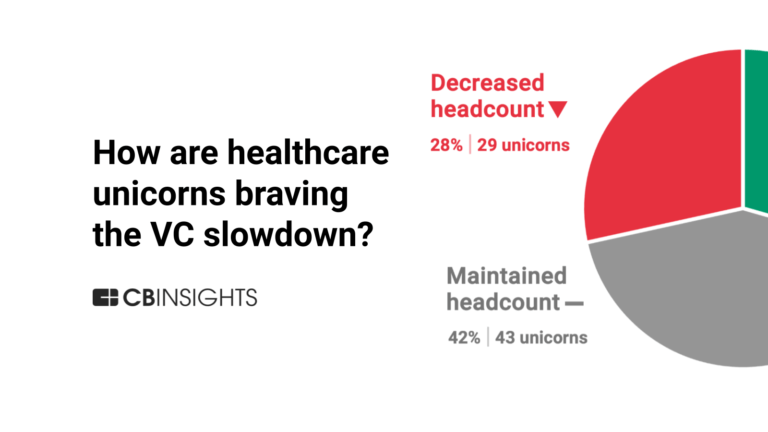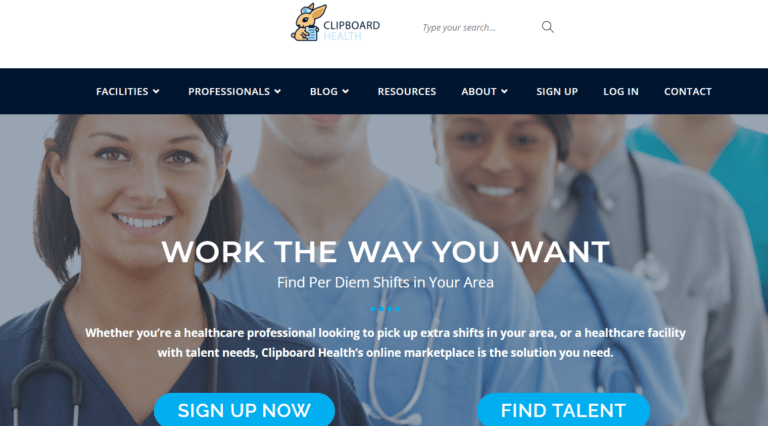
Clipboard Health
Founded Year
2016Stage
Series C | AliveTotal Raised
$80MValuation
$0000Last Raised
$30M | 3 yrs agoMosaic Score The Mosaic Score is an algorithm that measures the overall financial health and market potential of private companies.
-239 points in the past 30 days
About Clipboard Health
Clipboard Health runs a technology-focused company in the healthcare sector. It provides a platform connecting healthcare professionals with open shifts at various healthcare facilities, offering flexibility and freedom for professionals and staffing solutions for facilities. The company primarily serves the healthcare industry, including nursing facilities, senior care centers, and hospitals. It was founded in 2016 and is based in San Francisco, California.
Loading...
ESPs containing Clipboard Health
The ESP matrix leverages data and analyst insight to identify and rank leading companies in a given technology landscape.
The nurse staffing software market offers a comprehensive solution for healthcare organizations to effectively manage their nursing staff. This software utilizes advanced technologies to automate and streamline the process of nurse scheduling, shift management, and resource allocation. With nurse staffing software, healthcare providers can ensure adequate nurse coverage, improve patient safety, an…
Clipboard Health named as Outperformer among 11 other companies, including ShiftKey, Incredible Health, and Patchwork.
Loading...
Research containing Clipboard Health
Get data-driven expert analysis from the CB Insights Intelligence Unit.
CB Insights Intelligence Analysts have mentioned Clipboard Health in 2 CB Insights research briefs, most recently on Jul 14, 2023.
Expert Collections containing Clipboard Health
Expert Collections are analyst-curated lists that highlight the companies you need to know in the most important technology spaces.
Clipboard Health is included in 3 Expert Collections, including HR Tech.
HR Tech
4,044 items
The HR tech collection includes software vendors that enable companies to develop, hire, manage, and pay their workforces. Focus areas include benefits, compensation, engagement, EORs & PEOs, HRIS & HRMS, learning & development, payroll, talent acquisition, and talent management.
Unicorns- Billion Dollar Startups
1,244 items
Digital Health
11,072 items
The digital health collection includes vendors developing software, platforms, sensor & robotic hardware, health data infrastructure, and tech-enabled services in healthcare. The list excludes pureplay pharma/biopharma, sequencing instruments, gene editing, and assistive tech.
Latest Clipboard Health News
Mar 6, 2024
“Pivot” isn’t the bad word some people make it out to be. Many of the greatest companies in YC’s history pivoted along the way. Today Clipboard is built around the idea of connecting independent healthcare professionals — think nurses, medical assistants, or phlebotomists — with healthcare facilities to let them pick up shifts that work with their schedule. It means more flexibility for the nurses, and more much-needed help for the facilities. As of its last round , it's valued at over $1.3 billion. But that idea wasn’t the first idea. Or the second. Or the third. Clipboard Health founder and CEO Wei Deng tells me the company went through “six to eight different pivots” before it evolved into what it’s known for today. I recently talked to Wei to hear more about Clipboard’s origin story, and our conversation was absolutely full of insights. Here’s just some of what she shared with me. Talk to people, find the real problem Wei started out with a mission, and it’s one that hasn’t changed: to find ways to lift people up the socioeconomic ladder. The initial idea was to offer an alternative to student loans — an income-share agreement, years before the idea would become popular. They tried offering it to software engineers, but didn’t get many bites. They shifted to working with lawyers, then doctors — same deal. Another group they tried working with was nursing students. It was in the conversations with these soon-to-be nurses that Wei noticed a common thread: they were all very worried about actually being able to get a job after school. “The idea morphed into… okay, let me try to help nurses find jobs.” Wei tells me. “Helping them with their resumes, helping them with interviews, finding ways to give them clinical experience… It was hard, but it was the first pivot that was at least into this industry.” Wei and her team eventually decided to build a job board just for nurses — and it was there she discovered a deep-rooted problem she could solve. “The only people who would post were staffing agencies,” she says. “I would give them candidates, the staffing agency would hire them full time… but then every month, they’d give the nurse a different schedule. They’d say ‘Here’s the schedule for February, here’s [a completely different] schedule for March.’ It was incredibly hard to find full-time people who could commit to this ever-changing monthly schedule.” But what if she could flip the formula around? What if instead of facilities assigning nurses an unpredictable schedule, nurses could sign up for the shifts that work for them? “At some point I just called the facilities myself and asked: ‘Do you need the same person coming in every month? Or can I give you two different people to fill up that schedule?’ And they all said ‘Yes, we’re very short staffed, we just really need people.’ And this was before COVID, this is 2018!” She tried building software for the staffing agencies to do this — they shrugged it off in favor of paper and pen. The existing system worked for the agencies, but she knew it wasn’t working for everyone else involved. “At that point I was like, OK, there’s an opportunity here.” Find the right person Wei started reaching out to more facilities directly… but it’s not every day someone calls the front desk of a healthcare facility with a product pitch. The person on the other end generally didn’t know where to send her next. “I made hundreds of cold calls a day to try to get someone to even meet me in person […] but I would just get hung up on,” she says. “Everybody thought I was looking for a job. I couldn’t reach the decision makers, so I decided to just go and meet people in person.” Seven months pregnant at the time, Wei was Ubering from facility to facility to pitch the concept of Clipboard Health. After a month of this, a key puzzle piece fell into place; at a facility in Walnut Creek, she found the exact right person to talk to. “This woman… I think she felt sorry for me because I was super pregnant,” Wei notes. “She taught me a lot of the jargon; she was a scheduler and I was, basically, an agency. She decided to give me a chance — she was like: if you can get two people to fill these two shifts this weekend, I’ll hire you on a permanent basis.” “We filled those shifts,” she says with a smile. That facility signed on to be Clipboard’s first customer; today, they work with around 5,000 facilities. The benefits of being new While coming in from outside the health industry meant there was a bit of a learning curve, Wei now sees it as a hugely positive thing. “I’m very happy I didn’t have experience in healthcare… because I would have thought this was really too hard,” she says. “Sometimes experience scares you off. You've seen how others failed and you’re like 'Oh, we can’t do it.'. We would have had preconceived notions of how facilities work and what they care about.” “For us it was bad and good: we didn’t have the relationships, but we were able to think about a lot of things from first principles. That was kind of freeing.” If you don’t win, you learn Throughout my conversation with Wei, I notice a common theme: she is incredibly persistent. There were the aforementioned countless cold calls with facilities. Before that, there were dozens of rejections from VCs. Years before that, when studying to become an investment banker, she emailed thousands of bankers just to ultimately get career advice from a fraction of them. Even as a teen that just wanted to teach herself chemistry, Wei was cold calling universities to try to get them to let her use a lab. Most, understandably, said no. I asked her what keeps her motivated when met with rejection: “It’s something I tell my son, and I truly believe: the people who win the most also get rejected the most. When I was pitching investors, I think I got told ‘no’ sixty times. And I’m not a robot — I was crushed.” So she turned collecting rejections into a game. “If you get fifty ‘no’s, you’re not in a worse place than you are after just one. By collecting the ‘no’s, I’m just getting better at the thing!” “Something happens when you have that much practice,” she adds. “You can’t help but just get better. I truly believe that. I definitely felt crushed many times; people would say all sorts of mean things. But I would just regroup and think: one step closer to getting better.” When it’s working I asked Wei how, after a half-dozen-plus pivots, she knew this was the right idea to charge forward with. “I noticed a difference in how our customers engaged with us. Customers wanted to talk to us; they wanted to give us suggestions. They had emotions around our product. They were angry about stuff; they were elated about stuff. “ “Yes, from the qualitative data we were growing much faster” she notes “but you could also just feel the difference. You know when you have a date with someone and it’s kind of lukewarm, versus a date with someone who’s super exciting and you’re both interested? It was like that. I wasn’t sure it was working, but our customers cared a lot more.” What’s next Even after growing Clipboard into what it is today, Wei isn’t looking to stand still for long. She wants Clipboard to expand into other health care verticals that are natural fits — she mentions dental and anesthesiology as categories the company is exploring. But she’s also building what she sees as the “anti-Clipboard” — the thing that would ultimately replace some of the demand for Clipboard Health. Because if they don’t build it, someone else might. “I will never be one to say ‘We’re crushing it! We have product market fit! You have to be honest with yourself; markets change quickly.” Categories Greg Kumparak Greg oversees editorial content at Y Combinator. He was previously an editor at TechCrunch for nearly 15 years.
Clipboard Health Frequently Asked Questions (FAQ)
When was Clipboard Health founded?
Clipboard Health was founded in 2016.
Where is Clipboard Health's headquarters?
Clipboard Health's headquarters is located at 440 N Barranca Ave, Covina.
What is Clipboard Health's latest funding round?
Clipboard Health's latest funding round is Series C.
How much did Clipboard Health raise?
Clipboard Health raised a total of $80M.
Who are the investors of Clipboard Health?
Investors of Clipboard Health include Y Combinator, Gokul Rajaram, SciFi VC, Elad Gil, Caffeinated Capital and 12 more.
Who are Clipboard Health's competitors?
Competitors of Clipboard Health include Nomad, Florence, ShiftMed, ShiftKey, ConnectRN and 7 more.
Loading...
Compare Clipboard Health to Competitors

IntelyCare is a healthcare talent platform operating in the healthcare industry. The company offers a service that matches nursing professionals with job opportunities in various care settings, using an AI-based platform to provide per diem, contract, full-time, and part-time roles. The primary customers of IntelyCare are nursing professionals and healthcare organizations. It was founded in 2014 and is based in Quincy, Massachusetts.

Gale Healthcare Solutions specializes in providing digital technology for healthcare staffing within the healthcare industry. The company offers a platform that connects nurses and healthcare facilities, facilitating on-demand scheduling, credentialing services, and daily payroll options. Gale Healthcare primarily serves the long-term care, acute care, and travel healthcare sectors. It was founded in 2016 and is based in Tampa, Florida.

Incredible Health develops a healthcare career marketplace specializing in permanent nurse staffing using artificial intelligence (AI) enabled technology. The company offers a platform where nurses can find permanent roles, manage their careers, and access free continuing education resources. Hospitals and health systems utilize Incredible Health to streamline their hiring processes, reducing the time to hire and connecting with a pool of qualified nursing professionals. Incredible Health was formerly known as Lift League. It was founded in 2017 and is based in San Francisco, California.

Nomad specializes in providing temporary staffing solutions for clinicians and healthcare providers. The company offers a digital platform for travel nurses and allied health professionals to find and manage job placements in various healthcare settings. Nomad primarily serves the healthcare staffing industry, connecting qualified clinicians with temporary positions in hospitals and other medical facilities. It was founded in 2015 and is based in New York, New York.

Vivian Health offers a platform for healthcare professionals to find job opportunities, including staff, travel, local contracts, and per diem positions. It primarily serves the healthcare sector. Vivian Health was formerly known as Nursefly. It was founded in 2017 and is based in San Francisco, California.

Lantum is a workforce management platform focused on the healthcare sector, providing solutions to improve staffing efficiencies and reduce operational costs. The company offers a Connected Scheduling™ platform that includes an integrated rota tool, a digital staff bank, and access to a network of vetted clinicians, aimed at streamlining the management of healthcare workforces. Lantum primarily serves healthcare organizations such as Integrated Care Systems and Primary Care Networks. Lantum was formerly known as Network Locum. It was founded in 2012 and is based in London, England.
Loading...

